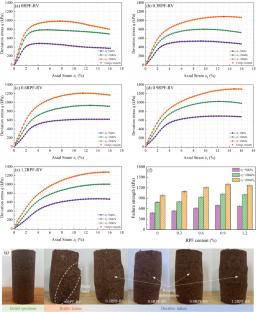Using recycled waste for soil improvement is a sustainable strategy that can reduce resource consumption. In this paper, recycled polyester fiber (RPF) is proposed to improve the engineering performance of red mud- improved volcanic ash (RV). A series of mechanical test were performed for RVs with five different content of RPF. And the microstructure was also investigated using scanning electron microscopy with energy dispersive spectroscopy (SEM-EDS) and mercury intrusion porosimetry (MIP) tests. Results show that RPF significantly reinforces the mechanical strength and toughness of RV and the optimum content of RPF is 0.9%. The Unconfined compressive strength (UCS), cohesion (c) and internal friction angle (φ) of reinforced soil enhanced by up to 122%, 40% and 8% compared to untreated soil at the optimum incorporation and optimum water content, respectively. The failure model of RPF-reinforced RV is converted from brittle to ductile, and the toughness parameters are significantly improved. Microscopic investigations reveal that RPF forms a complex three-dimensional structure within the reinforced soil. Adhesion and friction interactions at the fiber-matrix interface are the main reasons for the enhancement of strength and toughness. However, the performance of composites does not continue increasing with RPF content. Excessive fibers gather and twist to form weak zones, reducing the strength and stiffness of material. In practice, the optimal fiber content needs to be controlled to ensure the best mechanical properties. This eco-friendly soil improvement can promote the harmless utilization of red mud and waste polyester materials contributing to ground improvement techniques in volcanic areas.


